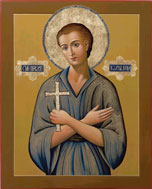|

On June 9th (May 27th by the old calendar) the Church commemorates Saint John the Russian.
St. John the Russian was born of pious parents in a small village of southern Russia in 1690. From his childhood he loved God and the Holy Church, and cared only to fulfill God’s commandments and be pleasing to Him. When he grew up he entered the military and was a soldier in the army of Emperor Peter the Great. While taking part in the Prussian campaign of 1771, St. John was taken prisoner by the Turks. The latter tried by every means of torment and cruelty to force the Russian prisoners to renounce Christ and convert to Islam. Many were terrified of torture and gave in, but St. John remained steadfast. Then the Turks sold him as a slave to a Moslem cavalry officer from the city of Procopion in Asia Minor. At first St. John’s Moslem owner tried by various means of cruelty to force him to convert to Islam, but St. John invariably replied to him: “I am your prisoner, you have power over my body, but not over my soul which belongs to Christ. I am ready to serve you, but neither threats, nor torture, nor death itself can separate me from Christ my God. I was born a Christian, and I will die a Christian!” These words finally had an effect on the master, and he left St. John in peace. John took up abode in a cave where horses were stabled, and so he looked after the horses and began leading a life of spiritual labors. During the night he often went to pray to the nearby church of the Great-martyr St. George, and helped the poor and the sick. The local inhabitants, for the most part Orthodox Greeks, revered him greatly.
Once, when the Turkish officer went to Mecca on a pilgrimage, John served his family at the table. During dinner, when the master’s favorite dish was brought out, the mistress expressed regret that her husband was away and could not taste it. John said to her: “Give me this dish, and I will deliver it to our good master!” The mistress thought that he simply wished to feed some poor Greeks and gave him the dish. Taking the dish into his cave, John became engrossed in prayer. At that same moment the Turkish officer, returning from the mosque to his locked room, found there a dish of hot rice pilaf. With great amazement he recognized his own china from home. Thus he and his family finally understood that John was a man of God and began to revere him. They wanted him to move into their house, but he refused and continued to lead an ascetic life in his cave.
When he felt his end draw near, John invited an Orthodox priest to perform the last rites, and after partaking of the Holy Mysteries, St. John peacefully reposed on May 27, 1730. Three years after his death, one of the local priests received a revelation concerning the incorruptibility of St. John’s relics, which were then translated to the church of St. George, where they wrought many miracles. In 1924, when Turkish Moslems drove out the Orthodox Greeks from their homeland in Cappadocia, the faithful, leaving Procopion for Greece, took with them their most prized treasure – the holy and incorruptible relics of St. John the Russian. They settled on the island of Euboea in the Aegean Sea, where they established the village of New Procopion, and in 1930 they built there a magnificent church in honor of St. John. To this day the shrine of St. John the Russian is one of the most popular shrines in Greece and is visited by thousands of pilgrims annually.
Once, a Greek ship with cargo on board sailed on one of the northern seas. A terrible storm came up. The members of the crew struggled valiantly, although death was imminent. The ship’s navigational system and radar equipment went out of commission. The ship lost its course. There was no hope left of their being saved. Then they heard the captain’s voice. He gave no more commands, but simply urged the crew to pray for salvation. He himself went to the ship’s chapel, which contained a revered icon of St. John the Russian, stood on his knees and prayed: “O Saint John! I pray to you now not for the salvation of my life, but for these poor sailors, who live outside their homeland and who struggle earnestly to earn bread for their families. Now they are perishing – Saint John, save them!”
The whole night, to the accompaniment of the churning waves and the whistling northern gale, the fervent prayer to St. John did not cease. In the early hours of the morning the ship miraculously found itself in the quiet harbor of Rotterdam. The captain, shaken by all that had occurred, put his ship in dry dock and went to Greece. There he made a pilgrimage to the relics of St. John the Russian, served a moleben of thanksgiving, and donated precious vessels to the church.
|